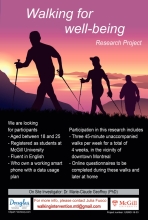This is an invitation to participate in Asra Milani’s doctoral research exploring the experiences of survivors of intimate partner violence (IPV) also known as domestic violence about accessing and using psychological and social support services for IPV.
This study is supervised by Dr. Ada Sinacore and explores both survivors and service providers’ views.
Criteria to participate in the study include anyone who:


Congratulations to KPE’s Sarkis Hannaian, 3rd year PhD Candidate (supervisor: Dr. Tyler Churchward-Venne), for winning best oral presentation at the 7th edition Metabolic Disorders and Complications (MeDiC) Research Day hosted by the Research Institute of the McGill University Health Centre (RI-MUHC).
Sarkis won for his presentation titled:

Erika Renda, KPE Ph.D. Candidate, recently had her thesis research titled Sex-specific myoelectric manifestations of localized fatigue during a multi-joint repetitive task published in the Journal of Electromyography and Kinesiology.
You can find the publication here.

Dr. Julie Côté, KPE, is the PI of the Biomechanics of Occupations and Sports (BOS) Laboratory. She presented on les Mécanismes des Troubles Musculosquelettiques (TMS) chez les hommes et chez les femmes: similitudes, différences, impacts. The congress took place from October 26-28th.

A celebratory evening was held to celebrate the graduation of the 28 locals who completed their McGill University Bachelor’s of Education studies on October 22.
The graduates were a part of a special program where they studied in the Kahnawake, with instructors from the community.
Read the full Kahnawake News article here.

On behalf of the Dept. of Kinesiology & Physical Education, Congratulations to all our 2022 Master's and Doctoral Graduates!
Read more about our Master's and Doctoral Graduates >>

Congratulations to the McGill Faculty of Education's Fall 2022 Graduates!
Watch the livestream of the Fall 2022 Convocation Ceremony.
For more information on Convocation, visit McGill's Graduation and Convocation website.

The McGill Mindfulness Research Lab is recruiting participants for a two-part paid study (compensation is $50) that will take place in-person at McGill University. The first part of the study takes place online (maximum 1.5h time commitment), and the second at our lab in the Education Building (maximum 1.5h time commitment).

Dr. Victoria Talwar, from the Department of Educational & Counselling Psychology, writes about the three steps to teach children about honesty and how to help kids get better at telling the truth, in this Greater Good Magazine article. She was also recently interviewed on Parenting Translator.

The SED-RG is inviting students between the ages of 18 and 25 you are invited to participate in online study that evaluates the effectiveness of a program to promotes social inclusion among students. The program will begin in January 2023, but from now until December 2022 students can indicate their willingness to participate by completing the pre-test survey.
What does participation entail?

PARTICIPATE IN RESEARCH FOR UP TO $100 IN COMPENSATION
Dr. Marie-Claude Geoffroy's research team is in search of participants for a walking for well-being research project in the vicinity of downtown Montreal!
Interested in participating? Please email us at walkingintervention.mtl [at] gmail.com
‘Make mental health & well-being for all a global priority’ is this year’s World Mental Health Day’s (October 10th) main message. While the pandemic has, and continues to, take a toll on our mental health, it is of even greater importance to recognize this day and to seek any opportunity to re-kindle our efforts to protect and improve mental health.

Dr. Shaheen Shariff, DISE, Dr. Christopher Dietzel, and Safia Amiry are working on an edited collection about the social impacts of the COVID-19 pandemic. The goal of this collection is to identify and analyze ongoing and emerging pandemic-related challenges and develop realistic guidelines and suggestions for a post-pandemic world.

Fitness Access McGill (FAM) Application Form

Doctoral work, by its nature a journey into uncharted territory, can be an uphill, lonesome slog at the best of times. Throw in a global pandemic’s uncertainty and isolating lockdowns – including no access to labs, libraries or even fieldwork – and it is little wonder that doctoral students were sending out distress signals. Recently, a team of Quebec researchers conducted an exploratory study on the effects the pandemic had on doctoral students. They discovered distress was much higher among female doctoral students, who also reported higher rates of disruption in their research progress.
